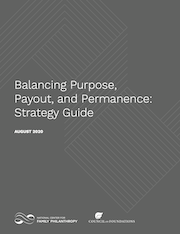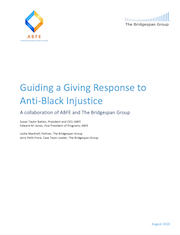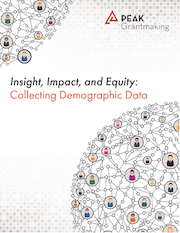Site Search
- resource provided by the Forum Network Knowledgebase.
Search Tip: Search with " " to find exact matches.
The Provident Bank Foundation announced the recipients of its inaugural Empowerment Grant cycle.
PBF’s Board of Directors has approved 41 multi-year grants totaling $515,000 in funding annually to support the missions of nonprofit organizations in New Jersey, New York, and Pennsylvania. Empowerment Grants range from $5,000 to $20,000 per grant and will be automatically renewed at the same level in 2026.
Projects funded by these grants align with PBF’s priority areas of education, human services, and workforce development, and their corresponding areas of interest that include community colleges, vocational programs, special education services, housing assistance, food security, health-care access for uninsured and underinsured individuals, youth mental health, job training, employment supports, and reentry programs.
“This is the first year of our Empowerment Grant program, which emerged from The Provident Bank Foundation’s recent strategic revisioning process focused on advancing equity and inclusion,” says Samantha Plotino, vice president and executive director of The Provident Bank Foundation.
The New Jersey Council for the Humanities (NJCH) will distribute $211,743 in funding to 18 organizations in its latest round of grant funding awards. Of these, 8 awards are Incubation Grants, which help organizations plan, research, prototype, experiment or expand existing programs. The 10 remaining awards are Action Grants, which help organizations implement humanities-based programs, which may be new or existing.
Notably, this round marks the first time since launching the Incubation and Action Grants in 2016 that NJCH received more applications and letters of intent for Incubation Grants than for Action Grants. NJCH received 42 total applications, of which 22 were for Incubation Grants, and 20 were for Action Grants.
“Incubation Grants serve the Council’s goal of increasing organizational capacity in the humanities sector by giving institutions the time and resources for program planning and development. We consider them a particular strength of our grants program since funders often do not provide this type of funding opportunity,” said Dr. Carin Berkowitz, NJCH executive director. “There’s real value in providing organizations the opportunity to spend more time thinking and planning programs, and we’re proud to provide that.”
Paterson One Square Mile is a hyper-local, place-based, cross-sector initiative with the goal of accelerating the revitalization of a concentrated area in Paterson, New Jersey. Utilizing strategically organized community engagement efforts focused on a bounded area within the city of Paterson, this community-led collective impact initiative aims to improve equitable outcomes in health, education, and economic opportunity for the residents of Paterson.
You will have the opportunity to hear from partners involved in shaping the Paterson One-Square Mile Project including: Jonathan GS Koppell, President, Montclair State University; Bryan Murdock, Montclair University; Malcolm McClain, Geraldine R. Dodge Foundation; Amanda Lopez, Transform Consulting Group; Richard Williams, St. Paul’s Community Development Corporation
Following the panel discussion, there will be a bus tour of the Paterson One-Square Mile Project that culminates with a stop to hear from nonprofit organizations that have benefited from this project. Program space is limited to twenty-five people.
Cost: Free for CNJG Members; $50 for Non Member Grantmakers
Continental breakfast and lunch provided.
Webinar Video
Join your CNJG CEO colleagues for a monthly peer-to-peer gathering via Zoom focused on you, your role, and your unique and particular challenges as the leader for your organization. If you’re the CEO, Executive Director, Executive Officer – this time and space from 4:00 – 5:00 pm on the third Wednesday of the month - is just for you. This is an opportunity to connect directly with your CEO peers for conversation, community and lightly facilitated topical conversations. The space is yours to share your experiences and challenges, ask questions, and offer ideas on how to support each other and your work. This is also an opportunity to build your relationships with you colleague CEOs in the CNJG network.
Cost: Free for CNJG Members
For more information, please reach out to Theresa Jacks, President and CEO, CNJG.
Join your CNJG CEO colleagues for a monthly peer-to-peer gathering via Zoom focused on you, your role, and your unique and particular challenges as the leader for your organization. If you’re the CEO, Executive Director, Executive Officer – this time and space from 4:00 – 5:00 pm on the third Wednesday of the month - is just for you. This is an opportunity to connect directly with your CEO peers for conversation, community and lightly facilitated topical conversations. The space is yours to share your experiences and challenges, ask questions, and offer ideas on how to support each other and your work. This is also an opportunity to build your relationships with you colleague CEOs in the CNJG network.
Cost: Free for CNJG Members
For more information, please reach out to Theresa Jacks, President and CEO, CNJG.
Join your CNJG CEO colleagues for a monthly peer-to-peer gathering via Zoom focused on you, your role, and your unique and particular challenges as the leader for your organization. If you’re the CEO, Executive Director, Executive Officer – this time and space from 4:00 – 5:00 pm on the third Wednesday of the month - is just for you. This is an opportunity to connect directly with your CEO peers for conversation, community and lightly facilitated topical conversations. The space is yours to share your experiences and challenges, ask questions, and offer ideas on how to support each other and your work. This is also an opportunity to build your relationships with you colleague CEOs in the CNJG network.
Cost: Free for CNJG Members
For more information, please reach out to Theresa Jacks, President and CEO, CNJG.

In partnership with the Council on Foundations, the National Center for Family Philanthropy has released Balancing Purpose, Payout, and Permanence: Strategy Guide.
How much should we spend? This is an essential question for foundations, and one of the most complex, particularly in moments of change or turmoil. This Strategy Guide invites you to reflect more deeply on how your foundation chooses to balance four factors—purpose, conditions and trends, time horizons, and assets for mission—especially in times of greater crisis or opportunity. It leaves the final decision to you, without judgment for your payout amount, lifespan, or mission.


Grantmakers occupy a powerful space of privilege in the social change sector. As such, they have a unique opportunity—and responsibility—to work proactively toward equity and inclusivity. Increasingly, grantmaking institutions are challenging themselves to live their values through their grantmaking practices.
For philanthropy to advance equity in all communities, especially low-income communities and communities of color, it needs to be able to understand the demographics of the organizations being funded (and declined), the people being served, and the communities impacted. That data should be used to assess practices and drive decision making.
PEAK Grantmaking is working to better understand and build the capacity of grantmakers for collecting and utilizing demographic data as part of their grantmaking.
“A Time for Action: Mobilizing Philanthropic Support for Boys and Young Men of Color” lays out a vision and a bold plan of action to maximize the potential of philanthropy and the private sector to increase opportunity for boys and young men of color that benefits the entire country. While it focuses on systems, policies, and practices that profoundly shape the lives of our sons and brothers, the recommended actions also help to create the conditions for all children and young adults to thrive, regardless of race, ethnicity or gender. The plan is bolstered by $194 million in initial investments in key initiatives, including for example programs to enhance school learning environments and reduce the overrepresentation of young people in the justice system.
This presentation will focus on the potential impact of federal healthcare policy changes on coverage and access to care in New Jersey. We will discuss changes under consideration by the current Presidential administration and the 119th Congress, including adjustments to program financing, eligibility, and other policy requirements, with potential broad implications for state Medicaid and Marketplace programs. Heather Howard, will provide an overview of the potential federal policy changes, vehicles for advancing and anticipated timing of such changes, and implications for New Jersey funders and nonprofits.
Heather Howard is a Professor of the Practice at Princeton University’s School of Public and International Affairs, where she co-directs the Global Health Program and is a faculty affiliate of the Center for Health & Wellbeing. She is also director of the State Health and Value Strategies program, a Robert Wood Johnson Foundation-funded program focused on assisting states with transforming their health care systems to be affordable, equitable and innovative. She served as New Jersey’s Commissioner of Health and Senior Services from 2008-2010. She also has significant federal experience, having worked as Senator Jon Corzine's Chief of Staff, as Associate Director of the White House Domestic Policy Council and Senior Policy Advisor for First Lady Hillary Clinton, as an Honors Attorney in the U.S. Department of Justice's Antitrust Division Health Care Task Force, and for the U.S. Representative Nita Lowey (D-NY). She received her B.A. from Duke University and her J.D. from NYU School of Law.
Cost: Free for CNJG Members; $75 for Non Member Grantmakers
This program is only open to staff and trustees from grantmaking organizations.
Programs in this Series:
March 13: Making Sense of Federal Policy: Understanding What it Means for NJ: Immigration
March 20: Making Sense of Federal Policy: Understanding What it Means for NJ: Health
March 27: Making Sense of Federal Policy: Understanding What it Means for NJ: Environment
April 3: Making Sense of Federal Policy: Understanding What it Means for NJ: Education
April 10: Making Sense of Federal Policy: Understanding What it Means for NJ: Housing
April 17: Making Sense of Federal Policy: Understanding What it Means for NJ: Media & Journalism
April 24: Making Sense of Federal Policy: Understanding What it Means for NJ: Arts
Webinar Video
Op-Ed: The Affordable Care Act at 15 years old — successful, but facing challenges - Heather Howard, Rachel Morrow - March 24, 2025
